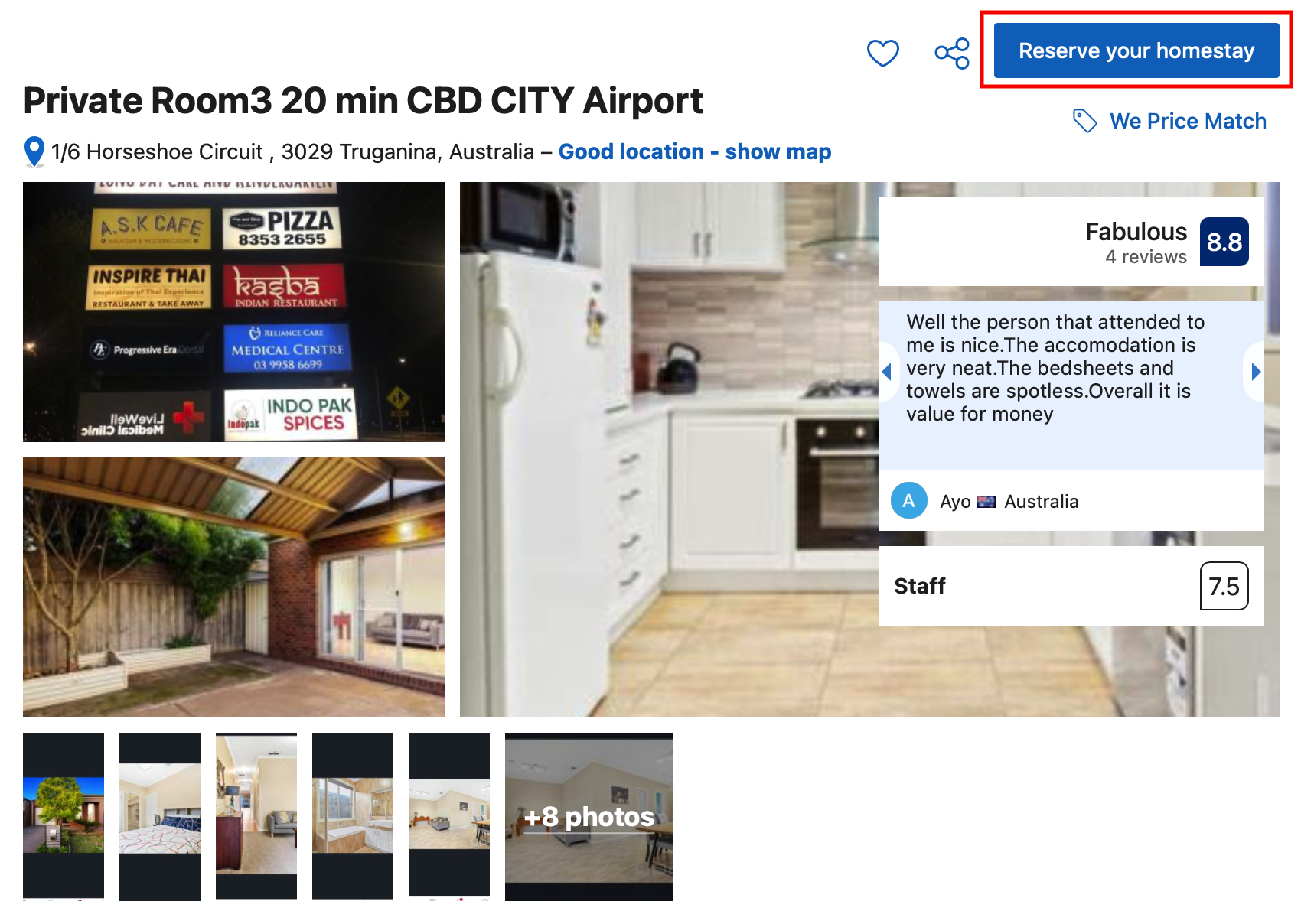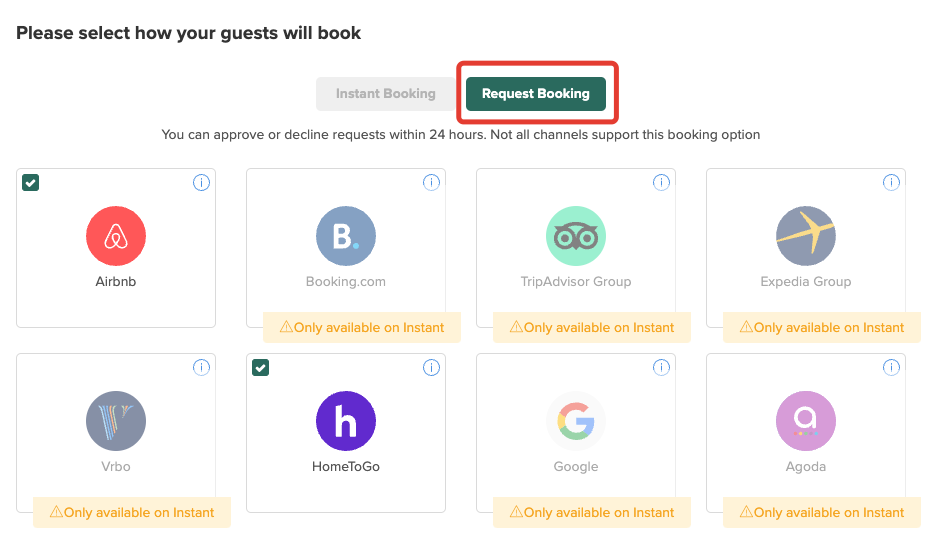Whether you’re a seasoned pro or just starting out, mastering the booking methods is key to unlocking the full potential of your vacation rental business. Want to learn more? Scroll down and read our guide on what request booking is and how to use it.
What is request booking?
Request booking means that potential guests express their interest in renting your vacation rental property by submitting a booking request. This request can be made through online platforms, such as Airbnb, Booking.com, or your own vacation rental website.
When you as a host receive a booking request like that, you need to review it and decide for yourself: accept or decline. Your decision can be based on anything from your rental’s availability to the guest’s needs.
This allows hosts and guests to contact each other (except on Booking.com) in the form of messages before the payment is made, plus it assures both you and the guest to agree upon the terms of stay (duration, guest’s needs, etc.) before the reservation is confirmed.
Most vacation rental platforms require you to respond to the request within 24 hours. When you accept the request, the guest will be charged and the booking confirmed. Accordingly, if you decline the request the guest won’t be charged and the booking declined.
Many hosts prefer using this booking method given its more personal nature. Yet there is another alternative that many hosts favour too.
Scroll down and find out more about the other type of booking method: Instant booking.
@Booking.com guest screen – Request to book
Instant booking or Request booking?
Instant booking is a method available on most OTAs that allows guests to make bookings directly without waiting for the host to accept or decline the booking request.
In online communities for hosts, many hosts claim that allowing Instant booking in their vacation rental increased the number of bookings they receive in general.
Let’s delve into and explore the pros and cons associated with the application of the two booking methods: request booking and instant booking.
@Booking.com guest screen – Instant booking
Instant booking ranks higher on Airbnb
If you allow Instant Booking at your property, it can improve your listing’s search visibility. When guests search for apartments to book, they can filter out the accommodations that do not have Instant booking turned on.
@Airbnb search filters
Pros of Request booking for hosts

@Airbnb booking inquiry screen
Pro 1. Request booking can be an option for beginners
If you just started hosting, request booking might be a beneficial choice for you. Request booking will allow you to get used to and figure out every step of the hosting process such as key exchange and check-in time that suits guests and you the best.
Guest experience is crucial in the vacation rental industry since it influences the reviews you will get. The first reviews are very influential and can affect your vacation rental’s reputation.
Once you get comfortable with the process and find yourself confident enough, you can decide whether to continue with booking requests or explore another alternative: Instant booking.
Pro 2. Avoid potential Airbnb scams with guest filtering
Every host has at least one story about a guest who was a nightmare to host. Additionally, although it is more common on the host side, there are a few scams who are guests. If you use only request booking, you have a bigger chance to avoid trouble by declining the request of sketchy guests.
Occasionally, it is not uncommon for guests to book an Airbnb solely with the intention of hosting a party. Look out for these small details and take the necessary precautions.



Comments supporting Request booking from @airbnb_host community on Reddit
Pro tip: with Your.Rentals channel manager you are able to switch between Instant and Request booking options – individually for each channel and for each listing?
Feel free to try it out, the tool is completely free to use. You pay only per booking.
The simplest way to create a great vacation rental listing
Pro 3. Connect with your guests
Request booking allows you to get familiar with your guests before accepting their booking request. Guest inquiries provide valuable insights to you as a host, allowing you to understand the expectations and their needs. Armed with this knowledge, you can make informed decisions and respond accordingly to guest requests.
Pro 4. Manage your schedule as per your preference
Since guests are dependent on your approval to confirm their booking, you have the benefit of deciding which guest’s request you will approve and welcome in your property when it comes to a situation where many guests have expressed their interest in your property for the exact dates.
You also have the opportunity to decline a request booking when you have your calendar full but you want to take a few days for cleaning and making sure that the next guests will be welcomed in a comfortable and tidy home. In this case, request booking is to your advantage as well.
Cons of Request booking
Con 1. Fewer bookings
More hosts have noticed that request booking might deter guests from booking and drive them to other vacation rentals that offer instant booking. Around 44% of guests in 2022 made their travelling decisions spontaneously, so they would need an answer right away.
Hence, short-term renters would rather book a property that allows instant booking, which is in their case more convenient. Some guests do not have the time to wait for the host’s response and book a room elsewhere.
Con 2. Replying too late – Guest inquiries
A decrease in bookings is closely tied to missed inquiries. As a sole operator of vacation rentals, it’s impossible to be available around the clock and accept/decline all requests in time. Your delayed responses can lead guests to seek other alternatives and make bookings with the competitors in the end. Unless you establish a mechanism to handle these inquiries promptly, guests may favour hosts offering instant booking.
Con 3. LOW conversion
Even when you get fewer bookings we see that the requests to the property managers are not often accepted so the conversion rate is lower. Which can affect your ranking in a negative way.
Con 4. LOW competitiveness
Even if you have lower prices, a potential guest might choose a more expensive listing just because of its flexibility compared to yours where they have to request the booking way before their stay. The golden rule is that if you cannot be cheaper you have to be flexible to stay competitive.

Conversation excerpts for @airbnb_host community on Reddit
Conclusion
The decision between Request booking and Instant booking solely depends on individual hosts and their preferred method of the booking process.
Request booking can provide a more personalised approach to guest management, allowing for more control over who you accommodate and scheduling flexibility. It is beneficial for new hosts. Yet, as with everything it has a downside too, which is potentially losing bookings due to guest impatience or missed inquiries.
Instant booking is favoured for its spontaneity, which can lead to increased bookings. Yet, hosts have less control over bookings. If you are in an unfortunate situation where guests damage your property during their stay, setting a security deposit, or relying on Aircover could be helpful.
Consider and evaluate these factors, and choose the method that suits best your capacity and business needs.






